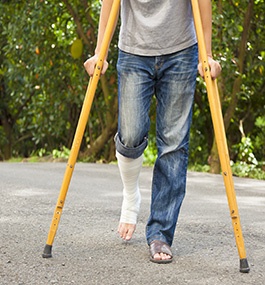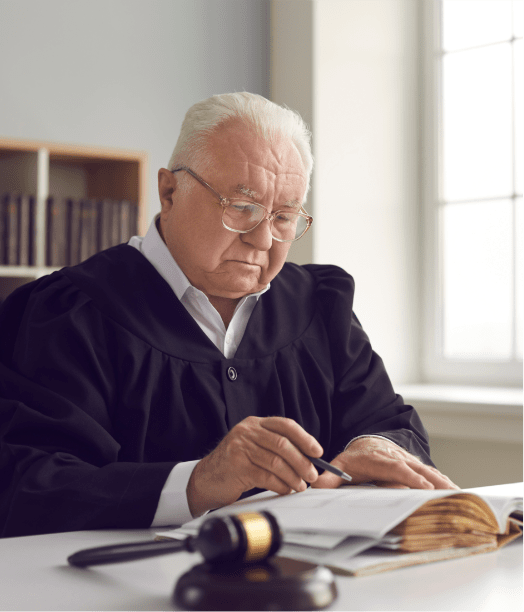How Does a Personal Injury Lawyer Decide to Take a Case?
Whether your personal injury lawyer decides to take your case or turn it down, it is up to them.
But, what are the factors that influence this decision?
Is there anything you can do to make your personal injury claim more favorable to a Personal Injury Attorney?
Well, of course, there is!
Some personal injury law cases are far more appealing and valuable than others.
If you want a personal injury lawyer to take your claim, consider these five facts before you make a call to schedule your free consultation.
I met with Harry Brown personally and he sat with me for 20 minutes at our initial consultation to explain everything. He even called after my surgery to see how I was doing. I met with him several more times after that and was kept informed about my case throughout. I highly recommend Harry Brown as an attorney.
The Top 5 Facts a Personal Injury Attorney Considers Before Taking Your Case
Who Is Liable For The Accident?
The first and most important determination in whether a personal injury lawyer will take on your case is who is liable for the accident.
The term liability refers to the party at fault. If the police report and witnesses both say you caused the accident, a judge or jury would likely think the same thing.
Therefore, most lawyers will not take your case because you were liable for your injuries.
If this is the case, your best chance would be to beat your ticket and have the fault overturned in traffic court.
If you need more depth information about what you need to help your case and ensure an attorney will take your case, click here.
Were You Injured In the Collision?
A case with clear liability but little to no injuries or damages is almost worthless to an attorney.
Most personal injury lawyers work on a contingency fee basis, which means they do not get paid until you receive a settlement.
Therefore, they cannot afford to take on a personal injury claim that they know will pay out next to nothing.
If you did not incur significant damages and you suffered no injuries, the likelihood of receiving a decent settlement offer is extremely low and not worth an attorney’s time.
How Long Was The Gap Between Your Accident and When You Received Medical Treatment?
Most professionals recommend seeing an Accident Doctor or Chiropractor no longer than 72 hours after an accident occurred, although same-day treatment is always recommended.
72 hours is regarded as a reasonable amount of time to see a medical professional after an accident happens, according to most insurance companies.
How Much Medical Treatment Do You Require?
In addition to seeing a doctor right after the accident, your attorney will also need to make sure you have attended all of your follow up appointments and are continuing your treatment.
If you think you are well enough to stop visiting your doctor and neglect your doctor’s orders, the insurance company will use this against you and potentially invalidate your accident injury claim.
The monetary value of your case is tied to your non-economic damages such as pain and suffering, loss of companionship, inability to participate in favorite activities, and your “loss of enjoyment.”

Compared to economic losses, these damages are much harder to calculate and prove. Your attorney will weigh a series of factors when they evaluate your non-economic damages.
They will consider:
- How severe your injuries are and your long-term outlook for recovery.
- The type and duration of your medical treatment.
- How long you may experience pain and emotional distress.
- The extent of your limitations after the accident.
- How your injuries impact your lifestyle and relationships.
Based on the above factors, your attorney will come up with a range of monetary values for your non-economic damages.
Have You Talked To An Insurance Adjuster?
If you spoke to an insurance adjuster, your attorney would need to know what you disclosed and if you provided a recorded or written statement about the accident and extent of your injuries.
If you have done this, it is a giant red flag to your potential attorney. Insurance adjusters often try to get accident victims to give a written or recorded statement about the accident and how it happened.
They will also want to know about your injuries.
They will attempt to engage you in conversation, where they will subtly try to get you to tell them about the accident and the extent of your injuries.
At this time, politely refuse discussing any of the facts. If you want to win your case, it is essential not to give details about the accident or injuries. This is because you may leave something out, discover an injury later, or your injury may become worse than you originally thought.
Providing an incomplete or inaccurate statement to the insurance company will result in them invalidating your claim later on.
Related Post: Which accidents fall under premises liability in Georgia?
Ready to Talk to a Lawyer Who Has Your Back?


Let Our Accident Attorneys Help You
If you have been involved in a personal injury accident that was not your fault and require an accident lawyer, contact the most professional and most successful personal injury attorneys in Georgia.
The Brown Firm offers Free Consultations to all injured victims in need of representation for their personal injury claims.
Call today or click on the button below to speak about your case with an attorney at The Brown Firm!
Our Recent Personal Injury Articles
Overloaded Truck Accidents in Georgia: Who’s Responsible?
A bus caught fire on Friday night at Ashford Dunwoody Road and I-285 West, causing delays during rush hour. The ramp was closed, and firefighters were able to put out...
The Most Common Causes of Teenage Driver Accidents
A bus caught fire on Friday night at Ashford Dunwoody Road and I-285 West, causing delays during rush hour. The ramp was closed, and firefighters were able to put out...
Postal Worker Dog Attacks: Protecting the Rights of Delivery Personnel
A bus caught fire on Friday night at Ashford Dunwoody Road and I-285 West, causing delays during rush hour. The ramp was closed, and firefighters were able to put out...
The Impact of Texting and Driving Laws on Car Accident Liability in Atlanta
A bus caught fire on Friday night at Ashford Dunwoody Road and I-285 West, causing delays during rush hour. The ramp was closed, and firefighters were able to put out...
Pedestrian Accidents on Crosswalks in Savannah: Proving Driver Negligence
A bus caught fire on Friday night at Ashford Dunwoody Road and I-285 West, causing delays during rush hour. The ramp was closed, and firefighters were able to put out...
Gearing Up for Survival: The Importance of Proper Motorcycle Safety Equipment
A bus caught fire on Friday night at Ashford Dunwoody Road and I-285 West, causing delays during rush hour. The ramp was closed, and firefighters were able to put out...
Why Nursing Home Staff Shortages Leave Residents Vulnerable to Potential Mistreatment
A bus caught fire on Friday night at Ashford Dunwoody Road and I-285 West, causing delays during rush hour. The ramp was closed, and firefighters were able to put out...
When Taxi Drivers Cause Pedestrian Accidents: Legal Options for Injured Parties
A bus caught fire on Friday night at Ashford Dunwoody Road and I-285 West, causing delays during rush hour. The ramp was closed, and firefighters were able to put out...
Bicycle Accident Settlements – What Compensation Can You Expect?
A bus caught fire on Friday night at Ashford Dunwoody Road and I-285 West, causing delays during rush hour. The ramp was closed, and firefighters were able to put out...
Nursing Homes Overprescribing Drugs to Silence and Subdue Patients
A bus caught fire on Friday night at Ashford Dunwoody Road and I-285 West, causing delays during rush hour. The ramp was closed, and firefighters were able to put out...
Contact The Brown Firm
Get the Answers and Compensation You Deserve
You’ll notice the difference when you contact The Brown Firm! Our local dedicated attorneys want to help you recover and rebuild.
Schedule your free consultation by calling (800) 529-1441 or completing our simple online form.

